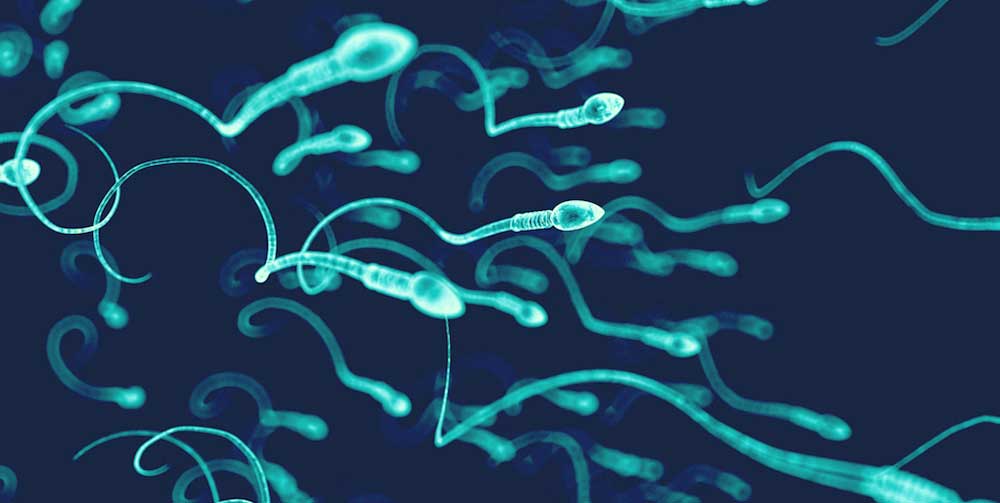Infertility is generally defined as a couples inability to conceive after one year of unprotected intercourse,[1] and this is becoming increasingly common. In 50% of infertility cases, a male factor is identified,[1] with one man in 20 believed to exhibit infertility.[2]
Oligoasthenoteratozoospermia (OAT) syndrome is the most frequently seen phenotype in male infertility, and may be of idiopathic origin (30% of male infertility cases)[3] or varicocele-related.[4] Interestingly, evidence also suggests that reactive oxygen species (ROS)-mediated sperm damage is a significant contributing pathology in 30-80% of cases of male infertility.[2]
Human spermatozoa are particularly susceptible to oxidative damage because they contain an extremely high concentration of polyunsaturated fatty acids, they exhibit no capacity for membrane repair, and possess a significant ability to generate ROS.[5] This oxidative damage can reduce sperm motility, interfere with the sperm-oocyte binding and fusion,[6] and also contribute to DNA damage and reduced sperm count. If fertilisation does occur despite spermatozoa DNA damage, the embryo will likely fail at the blastocyst or early fetal stage (i.e. miscarriage). If pregnancy does continue the compromised DNA may result in birth defects.[2] Furthermore impaired seminal antioxidant function and resultant oxidative stress may also result in poor IVF outcomes.[7]
Analysis of male sperm parameters is thus an essential step when aiming to address infertility, reduce miscarriage risk and support successful pregnancy and IVF outcomes.
Many trials support antioxidant therapy with essential nutrients (e.g. zinc, selenium, vitamin E) as a useful step toward improved reproductive health in OAT cases. Coenzyme Q10 (CoQ10) is an additional nutrient proving advantageous in these scenarios, with study outcomes warranting further investigation.
Low seminal plasma concentrations of CoQ10 have been correlated with impaired sperm parameters [8] (e.g. count/density, morphology, motility) and It has been shown that CoQ10 supplementation in men with idiopathic OAT results in improved semen parameters.[9,10] CoQ10‘s benefits are possibly related not only to its antioxidant role, but also its function in mitochondrial respiration (enhancing sperm endurance).[11]
Results of a randomised trial administering ubiquinol (200mg/daily) or placebo to 228 men with unexplained infertility revealed treatment to be significantly effective. Improvements in sperm density, sperm motility and sperm morphology were achieved.[10] A further 12 month study on 287 infertile men with idiopathic OAT supplemented subjects with 300mg CoQ10 twice daily. Not only were sperm count, motility and morphology improved but 34.1% achieved pregnancy within a mean period of 8.4 months.[9]
As ubiquinol is the reduced form of CoQ10, with higher antioxidant activity and superior bioavailability, it is likely an excellent incorporation to male fertility protocols. Lower doses may be used to achieve the desired results when compared to standard CoQ10 (ubiquinone/ubidecarenone) supplementation.
Further larger trials are still warranted to demonstrate ubiquinol’s success at improving conception and live birth rates, however its effectiveness for ameliorating sperm density, morphology and motility are incredibly promising.[12]
REFERENCES
- Trussell JC. Male reproductive endocrinology: when to replace gonadotropins. Semin Reprod Med. 2013 Jul;31(4):237-44. [Abstract]
- Tremellen K. Oxidative stress and male infertility--a clinical perspective. Hum Reprod Update. 2008 May-Jun;14(3):243-58. [Full Text]
- Cavallini G. Male idiopathic oligoasthenoteratozoospermia. Asian J Androl. 2006 Mar;8(2):143-57. [Full Text]
- Wei TC, Huang WJ, Lin AT, Chen KK. The role of hormones on semen parameters in patients with idiopathic or varicocele-related oligoasthenoteratozoospermia (OAT) syndrome. J Chin Med Assoc. 2013 Aug 8. [Full Text]
- Aitken RJ, Clarkson JS, Fishel S. Generation of reactive oxygen species, lipid peroxidation, and human sperm function. Biol Reprod. 1989 Jul;41(1):183-97. [Full Text]
- Pahune PP, Choudhari AR, Muley PA. The total antioxidant power of semen and its correlation with the fertility potential of human male subjects. J Clin Diagn Res. 2013 Jun;7(6):991-5. [Full Text]
- Atig F, Raffa M, Ali HB, Abdelhamid K, Saad A, Ajina M. Altered antioxidant status and increased lipid per-oxidation in seminal plasma of tunisian infertile men. Int J Biol Sci. 2012;8(1):139-49. Epub 2011 Dec 8. [Full Text]
- Nadjarzadeh A, Shidfar F, Amirjannati N, et al. Effect of Coenzyme Q10 supplementation on antioxidant enzymes activity and oxidative stress of seminal plasma: a double-blind randomised clinical trial. Andrologia. 2013 Jan 7. [Abstract]
- Safarinejad MR. The effect of coenzyme Q₁₀ supplementation on partner pregnancy rate in infertile men with idiopathic oligoasthenoteratozoospermia: an open-label prospective study. Int Urol Nephrol. 2012 Jun;44(3):689-700. [Abstract]
- Safarinejad MR, Safarinejad S, Shafiei N, Safarinejad S. Effects of the reduced form of coenzyme Q10 (ubiquinol) on semen parameters in men with idiopathic infertility: a double-blind, placebo controlled, randomized study. J Urol. 2012 Aug;188(2):526-31. [Abstract]
- Mancini A, Balercia G. Coenzyme Q(10) in male infertility: physiopathology and therapy. Biofactors. 2011 Sep-Oct;37(5):374-80. doi: 10.1002/biof.164. Epub 2011 Oct 11. [Abstract]
- Lafuente R, González-Comadrán M, Solà I, López G, Brassesco M, Carreras R, Checa MA. Coenzyme Q10 and male infertility: a meta-analysis. J Assist Reprod Genet. 2013 Aug 3. [Full Text]
DISCLAIMER:
The information provided on FX Medicine is for educational and informational purposes only. The information provided on this site is not, nor is it intended to be, a substitute for professional advice or care. Please seek the advice of a qualified health care professional in the event something you have read here raises questions or concerns regarding your health.


